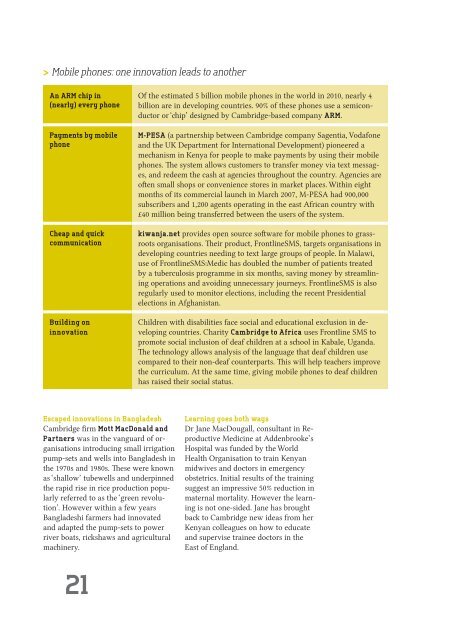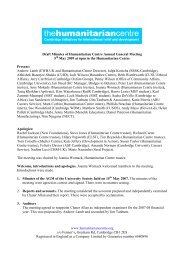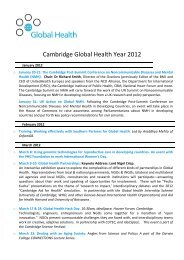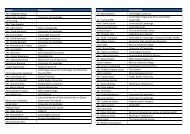Cambridge and international development - The Humanitarian Centre
Cambridge and international development - The Humanitarian Centre
Cambridge and international development - The Humanitarian Centre
Create successful ePaper yourself
Turn your PDF publications into a flip-book with our unique Google optimized e-Paper software.
Mobile phones: one innovation leads to another<br />
An ARM chip in<br />
(nearly) every phone<br />
Payments by mobile<br />
phone<br />
Cheap <strong>and</strong> quick<br />
communication<br />
Building on<br />
innovation<br />
Of the estimated 5 billion mobile phones in the world in 2010, nearly 4<br />
billion are in developing countries. 90% of these phones use a semiconductor<br />
or ‘chip’ designed by <strong>Cambridge</strong>-based company ARM.<br />
M-PESA (a partnership between <strong>Cambridge</strong> company Sagentia, Vodafone<br />
<strong>and</strong> the UK Department for International Development) pioneered a<br />
mechanism in Kenya for people to make payments by using their mobile<br />
phones. <strong>The</strong> system allows customers to transfer money via text messages,<br />
<strong>and</strong> redeem the cash at agencies throughout the country. Agencies are<br />
often small shops or convenience stores in market places. Within eight<br />
months of its commercial launch in March 2007, M-PESA had 900,000<br />
subscribers <strong>and</strong> 1,200 agents operating in the east African country with<br />
£40 million being transferred between the users of the system.<br />
kiwanja.net provides open source software for mobile phones to grassroots<br />
organisations. <strong>The</strong>ir product, FrontlineSMS, targets organisations in<br />
developing countries needing to text large groups of people. In Malawi,<br />
use of FrontlineSMS:Medic has doubled the number of patients treated<br />
by a tuberculosis programme in six months, saving money by streamlining<br />
operations <strong>and</strong> avoiding unnecessary journeys. FrontlineSMS is also<br />
regularly used to monitor elections, including the recent Presidential<br />
elections in Afghanistan.<br />
Children with disabilities face social <strong>and</strong> educational exclusion in developing<br />
countries. Charity <strong>Cambridge</strong> to Africa uses Frontline SMS to<br />
promote social inclusion of deaf children at a school in Kabale, Ug<strong>and</strong>a.<br />
<strong>The</strong> technology allows analysis of the language that deaf children use<br />
compared to their non-deaf counterparts. This will help teachers improve<br />
the curriculum. At the same time, giving mobile phones to deaf children<br />
has raised their social status.<br />
Escaped innovations in Bangladesh<br />
<strong>Cambridge</strong> firm Mott MacDonald <strong>and</strong><br />
Partners was in the vanguard of organisations<br />
introducing small irrigation<br />
pump-sets <strong>and</strong> wells into Bangladesh in<br />
the 1970s <strong>and</strong> 1980s. <strong>The</strong>se were known<br />
as ‘shallow’ tubewells <strong>and</strong> underpinned<br />
the rapid rise in rice production popularly<br />
referred to as the ‘green revolution’.<br />
However within a few years<br />
Bangladeshi farmers had innovated<br />
<strong>and</strong> adapted the pump-sets to power<br />
river boats, rickshaws <strong>and</strong> agricultural<br />
machinery.<br />
Learning goes both ways<br />
Dr Jane MacDougall, consultant in Reproductive<br />
Medicine at Addenbrooke’s<br />
Hospital was funded by the World<br />
Health Organisation to train Kenyan<br />
midwives <strong>and</strong> doctors in emergency<br />
obstetrics. Initial results of the training<br />
suggest an impressive 50% reduction in<br />
maternal mortality. However the learning<br />
is not one-sided. Jane has brought<br />
back to <strong>Cambridge</strong> new ideas from her<br />
Kenyan colleagues on how to educate<br />
<strong>and</strong> supervise trainee doctors in the<br />
East of Engl<strong>and</strong>.<br />
21





